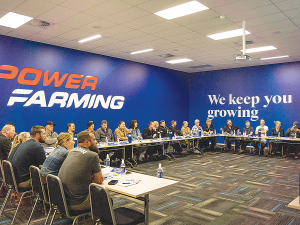M.I.A.
OPINION: The previous government spent too much during the Covid-19 pandemic, despite warnings from officials, according to a briefing released by the Treasury.
 A wide range of people from around the country attended the recent customer summit at PFG’s headquarters in Morrinsville.
A wide range of people from around the country attended the recent customer summit at PFG’s headquarters in Morrinsville.
At this year's National Fieldays, the Power Group (PFG) set out to thank farmers and contractors for their efforts in keeping the country going through Covid in 2020 with a 'We Love Farmers' theme.
Formed back in 1948, PFG now operates in New Zealand, Australia and the US employing 405 people, with an underlying philosophy of "we are local - so we support local".
"We now want to take the business to the next level, but we can't do that without our customers," says marketing director Brett Maber.
A recent Power Farming Customer Summit brought together a wide range of customers to the company's headquarters in Morrinsville. The aim was to help customers understand the PFG operation, and for PFG to understand the future expectations of its customers.
Following a site tour, Brett Maber explained the make-up of the company and its inherent philosophies.
"Our existence is to be there to support farmers, growers and contractors - without them we don't have a business," he explained. "We encourage our employees to think 'we're keeping them growing', down to an individual basis where we embrace - 'I'm keeping them growing'."
Maber went on to explain that, like many agricultural businesses, one of their biggest challenges was attracting and retaining good staff. He said this had resulted in a change of mindset about a decade ago, which saw recruitment start before school leaver age, on-the-job and residential training within the group's facilities, and upskilling staff members as technologies evolved.
This was followed by an open discussion about the positives and negatives of customers' own experiences with dealing with PFG and its local dealerships. With a pool of visitors from Southland, Canterbury, Gisborne and North Auckland, the majority praised the work of the local dealerships, particularly the fact in most cases they were dealing with family businesses.
No doubt, this is helped by the fact that in many cases, PFG operates a joing equity ownership model, with local individuals having "skin in the game" alongside PFG.
On the customers' wish lists were requests such as easier to understand invoicing. Others suggested a need for better installation of new products at the time of delivery, with ongoing out-of-season operator training, to get the best from their machines. The suggestion of 'How-to' sessions for phone and tablet applications also emerged as a possibility.
Looking at the broader picture, product knowledge on the service side raised some comments - particularly around junior techniciains getting exposure to new products, rather than old hands who often appeared to be too specialised in specific product ranges.
Larger operators also said more support during major breakdowns - with the likes of loan machines - to keep them going would be a huge benefit.
Summing up the event, those invited appreciated the opportunity to interact with PFG.
"We tend to buy product on the job it does, but importantly when and where we can get it fixed if it breaks down," Josh Bleeker from South Canterbury said. "So, parts and service support is critical for us."
Likewaise, Paul and Helena Hoekstra from Southland said they really like the family feel at their local PFG dealership and find the backup outstanding.
"On our wishlist, we'd like to see more focused local salespeople who have a better understanding of the individual models in a product range that would best suit our area."
The Meat Industry Association of New Zealand (MIA) today announced that Chief Executive Officer Sirma Karapeeva has resigned from the role.
The winners of the 2026 Hawke’s Bay/Wairarapa Dairy Industry Awards were announced at the annual awards dinner held at Copthorne Solway Park in Masterton on Thursday evening.
Environment Southland is welcoming this week’s decision by the Environmental Protection Authority (EPA) to approve the release of Blaptea elguetai, a leaf‑feeding beetle that will help control the highly invasive Chilean flame creeper.
This March, the potato industry is proudly celebrating International Women’s Day on 8 March alongside the International Year of the Woman Farmer, recognising the vital role women play across every part of the sector — from paddocks and packhouses to research, leadership, and innovation.
Fruit trader Seeka posted a record profit and returns to shareholders in 2025.
Recent weather events in the Bay of Plenty, Gisborne/Tairawhiti, and Canterbury have been declared a medium-scale adverse event.